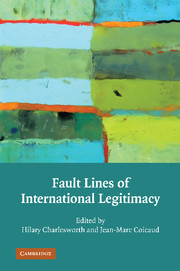Book contents
- Frontmatter
- Contents
- Acknowledgments
- Contributors
- Introduction
- PART I FROM THE HISTORY AND STRUCTURE OF INTERNATIONAL LEGITIMACY TO FAULT LINES IN CONTEMPORARY INTERNATIONAL POLITICS
- 1 Legitimacy, Across Borders and Over Time
- 2 Deconstructing International Legitimacy
- 3 The Evolution of International Order and Fault Lines of International Legitimacy
- 4 Intervention in a “Divided World”: Axes of Legitimacy
- 5 From Berlin to Bonn to Baghdad: A Space for Infinite Justice
- PART II THE UN SECURITY COUNCIL: EXPRESSION, VENUE, AND PROMOTER OF INTERNATIONAL LEGITIMACY?
- PART III LEGITIMACY OF INTERNATIONAL INTERVENTIONS AND HIERARCHY OF INTERNATIONAL RIGHTS
- PART IV IN SEARCH OF NEW FORMS OF INTERNATIONAL LEGITIMACY: BETWEEN POWER AND PRINCIPLES
- Conclusion: The Legitimacies of International Law
- Index
- References
3 - The Evolution of International Order and Fault Lines of International Legitimacy
Published online by Cambridge University Press: 06 April 2010
- Frontmatter
- Contents
- Acknowledgments
- Contributors
- Introduction
- PART I FROM THE HISTORY AND STRUCTURE OF INTERNATIONAL LEGITIMACY TO FAULT LINES IN CONTEMPORARY INTERNATIONAL POLITICS
- 1 Legitimacy, Across Borders and Over Time
- 2 Deconstructing International Legitimacy
- 3 The Evolution of International Order and Fault Lines of International Legitimacy
- 4 Intervention in a “Divided World”: Axes of Legitimacy
- 5 From Berlin to Bonn to Baghdad: A Space for Infinite Justice
- PART II THE UN SECURITY COUNCIL: EXPRESSION, VENUE, AND PROMOTER OF INTERNATIONAL LEGITIMACY?
- PART III LEGITIMACY OF INTERNATIONAL INTERVENTIONS AND HIERARCHY OF INTERNATIONAL RIGHTS
- PART IV IN SEARCH OF NEW FORMS OF INTERNATIONAL LEGITIMACY: BETWEEN POWER AND PRINCIPLES
- Conclusion: The Legitimacies of International Law
- Index
- References
Summary
The interactions that decide the outcome of the confrontation between forces favoring the status quo and those calling for change are not to be taken lightly. This issue is examined in this chapter, moving the study from what has been primarily a static approach to international legitimacy to a more dynamic approach. The objective is simply to offer indirect normative and political clues on what could be the right answers to present controversies and conflicts of international legitimacy. First, we explore how international legitimacy is about socializing international life by trying to find the right balance between status quo and change. Second, the chapter analyzes the main ideal types of fault lines of international legitimacy, specifically through the work of the United Nations (UN) Security Council.
Legitimacy and the Stability and Change of the International System
Legitimacy plays an important role in the stability of international order, and there are at least three reasons for this. First, legitimacy provides a rationale to account for the ways in which the international system is organized, including the inequalities that it never fails to encompass. Second, legitimacy provides tools (e.g., the rationale) to manage the challenges that may be mounted against the international system and the possible changes associated with them. Third, because of the premium that democratic culture puts on the consent, participation, and representation of state and nonstate actors, the stability function of legitimacy has recentlly become even more significant as international order is increasingly influenced by democratic values.
- Type
- Chapter
- Information
- Fault Lines of International Legitimacy , pp. 87 - 114Publisher: Cambridge University PressPrint publication year: 2010



